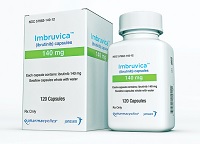 |
Another cancer drug approval, another nosebleed-level price. Johnson & Johnson ($JNJ) and Pharmacyclics' ($PCYC) breakthrough drug Imbruvica (ibrutinib) won FDA approval yesterday for a rare form of lymphoma. Soon after, the companies said Imbruvica would be priced at more than $90 per pill. At four pills per day, that's about $130,000 per year.
That's the sticker price, subject to rebates and other discounts for payers. But even so, $130,000 is among the highest prices on a new cancer drug in recent memory--and cancer is a price-elastic field (at least for now). Dendreon ($DNDN) got itself into trouble with a $90,000 price on its prostate cancer therapy Provenge, and Bristol-Myers Squibb ($BMY) raised eyebrows with its $120,000 tag for the melanoma drug Yervoy. The latter proved to be little object for Yervoy, which hit the ground running, sales-wise. Roche's ($RHHBY) newly minted breast cancer treatments Perjeta and Kadcyla are priced somewhat lower--about $71,000 and $94,000 per year, respectively--but they're designed to be used together. That's $165,000 for the combo.
Patients won't bear the brunt of Imbruvica's cost. As TheStreet reports, Pharmacyclics will offer two months' worth of the drug for free to patients who have trouble on the insurance-reimbursement side. Plus, the company is setting up copay assistance plans for patients who can't afford their share of the cost.
Payers, on the other hand, have to add Imbruvica to the list of high-priced therapies patients want. The most skeptical are likely to focus on the supporting research; approved under the FDA's new "breakthrough" therapy program, Imbruvica has so far delivered Phase II data showing an impressive overall response rate. More than 65% of patients responded to the drug, for a median duration of 17.5 months. Whether Imbruvica extends patients' lives hasn't yet been proven. Nor has its ability to tamp down cancer progression. The companies will go on to conduct Phase III trials, aiming to strengthen the case.
Still, for patients eligible for Imbruvica--those who've seen their cancers progress after at least one prior treatment--the promise of a response is a big deal. As J&J notes in its press release, mantle cell lymphoma (MCL) is a "challenging disease associated with poor prognoses." Just the fact that the FDA chose to grant Imbruvica breakthrough status shows there's a clear need for new drugs in the area.
MCL affects only 2,900 patients in the U.S. per year, J&J says. With so few patients affected, insurers are better able to absorb the high cost. At least that's how it's worked for rare-disease drugs in the past. In the orphan drug world, Imbruvica isn't all that expensive. Just think of Alexion ($ALXN) and its Soliris treatment for paroxysmal nocturnal hemoglobinuria and other rare disorders, which bears a $400,000-plus annual price tag. Or Sanofi's ($SNY) rare-disease meds acquired with Genzyme; Fabrazyme and Cerezyme run about $200,000 per year. And Vertex Pharmaceuticals' ($VRTX) cystic fibrosis drug costs some $290,000.
Soon enough, Imbruvica will expand into other, related diseases. It will become more of a cancer drug, less of a rare-disease med. J&J and Pharmacyclics have their eyes on chronic lymphocytic leukemia (CLL) and small lymphocytic lymphoma, a broader market. Imbruvica won the FDA's coveted "breakthrough" status for those two uses as well. For CLL, fewer Imbruvica pills are required, and that will bring the cost down to about $8,200 per month, Pharmacyclics CEO Robert Duggan said, as quoted by The New York Times. That works out to about $98,400 per year.
As TheStreet notes, analysts were expecting an Imbruvica price of about $110,000. Investors are likely to cheer at the higher price, expecting higher sales as a result. Already, analysts are looking for $1.3 billion in 2018 sales, according to EvaluatePharma.
The real pricing test will come in other countries with government cost-effectiveness agencies. The U.K.'s National Institute for Health and Care Excellence (NICE) initially balked at Yervoy's sticker, pressuring Bristol-Myers to offer a discount.
- get the release from J&J
- read TheStreet's story
- check out the NYT piece (sub. req.)
Special Reports: Top 20 Orphan Drugs by 2018 - ibrutinib | Top 10 Experimental Cancer Drugs 2013